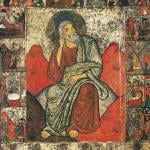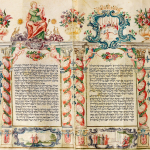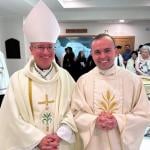Rouen, France, Aug 3, 2016 / 06:01 am (CNA/EWTN News).- During Tuesday's funeral Mass for Fr. Jacques Hamel, who was killed last week by Islamic State terrorists, the Archbishop of Rouen said the priest's death urges us to respond to God in our lives. “The death of Jacques Hamel called me to a frank yes – not to a tepid yes,” Archbishop Dominique Lebrun said Aug. 2 at Rouen's Cathedral of Our Lady of the Assumption. “A 'yes' to life, like Jacques' 'yes' at his ordination. Is this possible? We must respond yes every time. God will not force us. God is patient. God is merciful. Even when I, Dominique, said no to love, even when I said to God 'perhaps later', even when I forgot, God waits for me because of his infinite mercy. But today, can the world still wait for the chain of love which will replace the chain of hate?” Fr. Hamel, who was 85, was killed July 26 in Saint-Étienne-du-Rouvray, a suburb of Rouen, while saying Mass. The assailants, who were armed with knives, declared their allegiance to the Islamic State, and were later shot dead by police. Thousands attended the priest's funeral Mass, including government officials and representatives from the Jewish and Muslim communities. Archbishop Lebrun said Fr. Hamel “has no more to fear God. He presents himself with his just works.” “Of course, we cannot pass judgement on the heart of our brother. But so many testimonies cannot be wrong! Fr. Jacques Hamel had a simple heart.” He recounted that Fr. Hamel had been ordained a priest 58 years, adding that before the priest's years of faithful charity “I feel small.” “Jacques, you were a faithful disciple of Jesus. Wherever you went, you did well.” Prior to the homily, Fr. Hamel's sister Roselyne spoke about his mercy and love, saying that he had refused to become an officer during his military service in colonial Algeria so that he would not have to order others to kill. She said: “The God of love and mercy chose you to be at the service of others … until your last breath.” Archbishop Lebrun suggested that Fr. Hamel's confidence in Christ's resurrection was “rooted in the experience of death in Algeria … Perhaps this mystery, this secret you confided was what was winning hearts in our assembly: yes, Christ is risen. Death is not the last word.” “For you, Jacques, the resurrection of Jesus is not a catechism lesson, it is a reality, a reality for our heart, for the secret of the heart, a reality at the same time to share with others, as a confidence,” the archbishop said. He added, “God knows, before the reality of your death – so brutal, unjust, and horrible – that we must look deep into our hearts to find the light.” The archbishop exhorted those present: “let us be simple and true with ourselves. It is in our heart, in the depth of our heart that we must say 'yes' or 'no' to Jesus, 'yes' or 'no' to the path of truth and of peace; 'yes' or 'no' to the victory of love over hate, 'yes' or 'no' to his resurrection.” He lamented, asking if there would be “any other killings before we are to be converted to love, and to the justice which builds up love?” Archbishop Lebrun exclaimed that there are “too many deaths in the Middle East, too many deaths in Africa, too many deaths in America! Too many violent deaths, enough!” He recalled that Fr. Hamel tried to push away his murderer with his feet, saying twice, “Go away, Satan.” The archbishop interpreted this as Fr. Hamel expressing his “faith in man, created good, but grasped by the devil.” “With Jesus every man, every woman, every human person can change their heart with his grace. We recall the words of Jesus even as they seem beyond our strength today: 'I say to you: love your enemies, and pray for those who persecute you'.” The archbishop said that in the face of such diabolical violence, we must remember in our heart that “God has fashioned us for love” and be ready to pray for those in the power of evil. He offered his admiration to Fr. Hamel's family, saying, “Your brother, your uncle was a pillar. He continues to be.” “It is not for me yet to declare Fr. Jacques 'martyr'. But how do we not recognize the fecundity of the sacrifice he has lived, in union with the sacrifice of Jesus which he faithfully celebrated in the Eucharist?” Archbishop Lebrun then turned to the Catholic community of France, especially those who do not often attend Mass. He appealed to them to visit a church in the coming days “to affirm that violence will not take root in your heart, to ask for grace from God; please to light a candle in the church, a sign of the resurrection, to collect yourself and open your heart to what is most profound; if you can to pray, to supplicate.” Read more
















